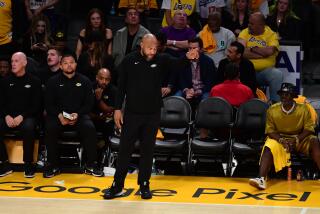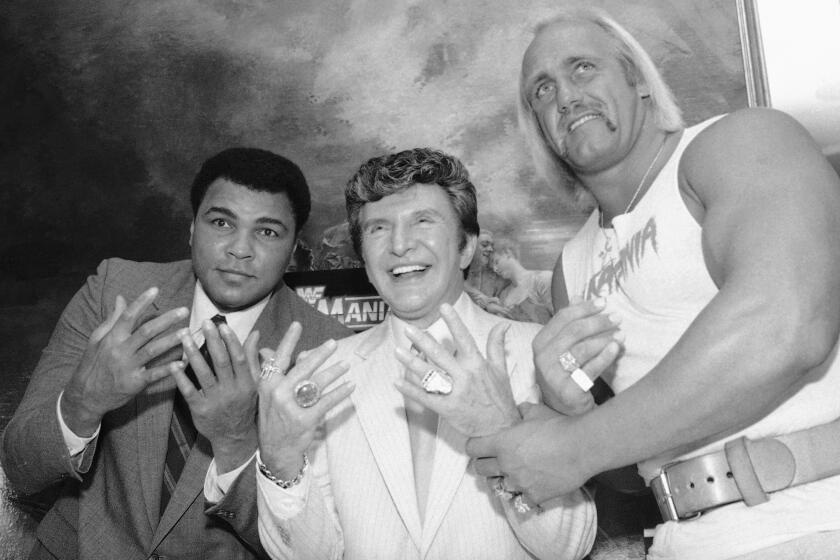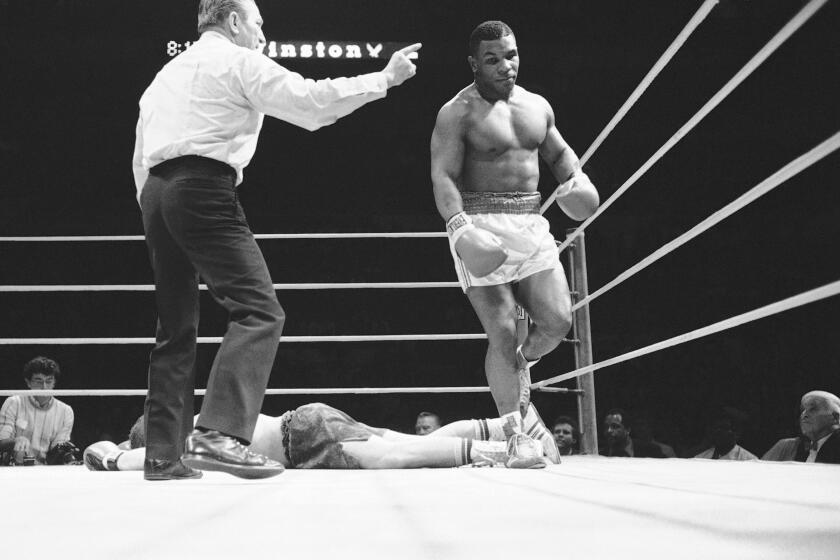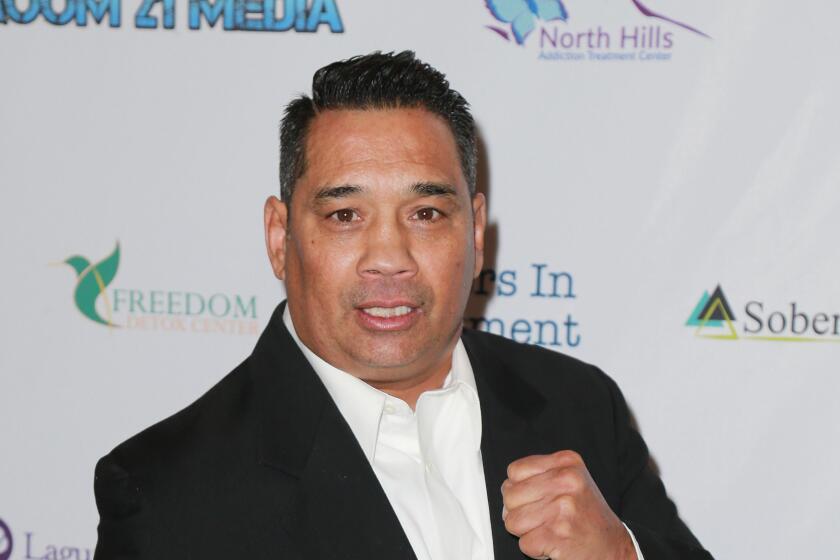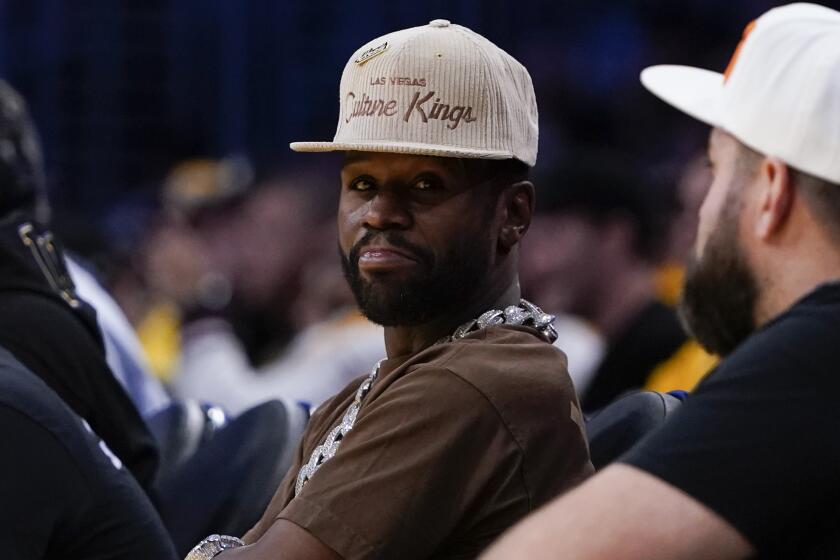A Hard Person to Get a Fix On
The letters arrive every two weeks or so, a return address of North Kern State Prison.
The handwriting shows great care, serifs and small flourishes, even if some of the words are misspelled. There is a quote from John F. Kennedy:
“A man does what he must -- in spite of personal consequences, in spite of all obstacles and dangers and preasures -- and that is the basis of all human morality.... Each man must decide for himself the course he must follow.... For this each man must look into his own soul.”
Then, in his own words, the writer concedes: “Regrettably, I Joey Torres did not.”
These correspondences stretch five pages or more, sometimes angry, sometimes apologetic for a “profligated” life. Is it too late now? If Joey Torres looked into his soul, what would he see?
A promising young boxer. A murderer. A guy who pals around with millionaire athletes. An informant at the heart of a federal boxing investigation.
Torres has been all these things and more, too much for the 40-some years he has been on this planet, certainly too much for a dozen handwritten pages.
He sits in prison confined to his cell for all but an hour each day, serving a life sentence. He asks for more paper and envelopes.
“I would enjoy to visit with you,” he writes.
The man has a story to tell.
*
First of all, his name isn’t Joey Torres. He was born Kim Joseph Torrey, raised in a working-class Panorama City neighborhood.
“He looked like ‘Leave It to Beaver’ when he was a kid,” his sister, Marcy Bautista, says.
That sweet exterior belied a toughness that led him to Frankie Goodman’s Kid Gloves boxing program at age 9. “My father had the mentality that if you get in a fight and get [beaten], you get [beaten] twice as much at home,” he said in a biography on a boxing website.
As a teenager, he fell in with a Latino gang and began calling himself Torres. Soon he earned the nickname “Boxer” and was accumulating tattoos that would eventually cover his arms and chest.
“I got lost,” he told The Times in 2002. “I let the gangs and the neighborhood and the older gang members influence me. I was ‘Boxer’ from 18th Street. I was a gang leader and I was expected to hurt people.”
Even as he shone in the ring, winning an Amateur Athletic Union championship in 1976, Torres drifted deeper into trouble, getting hooked on cocaine.
On a summer evening in 1979, he pulled into a Pico Rivera gas station, and what happened next depends on whose story you believe.
Torres has long insisted the attendant, Armando Jasso Cardenas, was also his boxing manager and owed him money. A fight broke out, Cardenas pulled a gun and a single shot went off.
Prosecutors tell a different version. They say Torres shot Cardenas in the chest and took $335 from a safe in the storage room. Their report makes no mention of the victim’s being a boxing manager.
The 19-year-old Torres pleaded guilty to first-degree murder with an understanding that he would be sent to a California Youth Authority facility and serve no more than six years.
In his website biography, Torres says: “They came to me and said, ‘Just plead guilty and you’ll be out in two, three years.’ Why take a chance on going to jail for life?”
But three years later, authorities intercepted a letter in which he told his girlfriend to buy a gun. He claimed it was for her protection. They said he wanted it smuggled to him.
A judge ordered him transferred to state prison to serve a life sentence.
*
Every good tale has twists and turns. The best characters are not entirely good or bad -- they have a bit of both in them.
Though Torres’ parents supported their son, they also described him as “a very skillful fabricator of stories who can weave fantasy and fiction together in a most convincing fashion,” according to court records.
By the fall of 1982, it might have been easy to write Torres off as a hard-core criminal and nothing more, locked away for life. But he has never been that simple or straightforward.
The first surprise came shortly after his arrival at the state penitentiary in Vacaville. Torres came upon an inmate attacking a female guard and pulled the man off. In doing so, he violated an unwritten jailhouse code: Never side with the law.
Worried about reprisals from other prisoners, authorities transferred him to a Nevada penitentiary where his tale took a new direction.
According to documents filed with the court, Torres spent as many as 10 hours a day on the telephone. No one is quite sure how, but he got hold of numbers for big-name athletes and called them collect, sometimes over and over, until they accepted.
He had a plan to help at-risk youths.
Boxer Carlos Palomino was intrigued enough to drive to Nevada to meet him. Eric Davis was on the road with the Cincinnati Reds when Torres called his hotel room.
“It was pretty amazing that he found me but he said he could track anybody down if he wanted,” the retired baseball player said. “He told me how he wanted to help these kids and he wanted me to help him by signing [autographs] for them.”
At the same time, Torres contacted nonprofit organizations such as Youth Development Inc. in Albuquerque.
“We ignored him for the longest time but he persisted,” said Chris Baca, the group’s president. “He said he could get us Emmitt Smith and Paul Molitor and Carlos Palomino for fund raising. This is from prison. I said ‘Right, and I’m the Queen of England.’ ”
But Torres came through, helping the group raise thousands of dollars through autographed memorabilia and appearances by the sports celebrities he had promised.
It was the mid-1990s and he had been transferred to a New Mexico penitentiary. As his charity work continued, he focused on another goal: Getting out of prison.
His case had been through the appellate process a decade earlier, rejected by the 9th Circuit Court of Appeals. Working from the prison library, he argued anew that his guilty plea should be thrown out because no one had informed him he could be sent to prison to serve the entire sentence.
In December 2001, a California judge agreed and set bail at $100,000. Shortly after New Year’s, Torres was released.
As he now writes, “My dreams were coming true.”
*
In her Norwalk office, Deputy District Attorney Pamela Frohreich keeps a file on the Torres case, a sheaf of reports from sheriff’s deputies, probation officers and prison officials spanning 25 years.
She can understand why people such as Davis and Baca like Torres. “He’s charming,” she says.
But she warns: “He is a chronic and compulsive and quite clever liar. You cannot believe the day of the week he tells you it is.”
Fresh out of prison at 41, Torres persuaded Bob Arum, one of boxing’s top promoters, to sign him to a four-fight contract.
“I’m not under any illusions that this guy is going to be a great fighter or have a long career,” Arum said then. “We’re just delighted that we’re the ones to help him realize his ambitions.”
One of Arum’s matchmakers, Sean Gibbons, arranged for Torres to make his debut against a journeyman named Perry Williams at the Arrowhead Pond in April 2002. According to Torres, Gibbons took other steps to ensure victory.
First, Torres claims in his letters to The Times, Gibbons told him the fight was fixed.
Then they addressed another problem: Torres worried about passing the required physical exam because he claims to suffer from hepatitis C, cirrhosis of the liver and 20/400 vision. He writes that Gibbons told him “not to worry I’ll take the tests for you.”
Gibbons’ attorney, David Z. Chesnoff, did not return calls from The Times but told Associated Press last week, “If Mr. Torres ever makes an accusation like this in a court of law, I’ll look forward to cross-examining him.”
As the fight approached -- and the media trumpeted Torres’ comeback tale -- there remained one more concern. The district attorney’s office was appealing Torres’ release and he became increasingly worried.
Thus began what he calls “my dance with the Devil.”
The FBI had already launched a boxing investigation when Torres called them to offer information about a fixed fight. He writes: “I met with agents who guaranteed me, ‘If we can prove your fight is fixed, and you work with us to clean up boxing, there’s no way your going back to prison.’ ”
The FBI, which by policy does not identify informants, has declined to comment.
From then on, Torres was often accompanied by a man he introduced as his cousin, “Big Frankie,” who had supposedly sold a trucking business back East and wanted to get into the fight game. Frank Manzione was, in fact, an undercover agent.
On the morning of the fight, they met with Gibbons and Williams in a hotel suite where, Torres writes, “after all the furniture was moved, Mr. Gibbons then showed my opponent from which punch he should fall, and when.”
A source close to the investigation confirmed that authorities believe the fight was choreographed.
That night, an out-of-shape Torres went down in the first round but his opponent threw few punches after that. Torres won with a second-round knockout, the crowd chanting “WWF, WWF.”
A state investigation found no evidence of a fix and Torres abruptly retired.
In the months that followed, he remained a welcome figure at Arum’s Top Rank offices in Las Vegas, often accompanied by Big Frankie. The two men traveled to Albuquerque, ostensibly to scout boxers, and met with Baca.
The youth worker recalls Big Frankie as “a nice guy.” He had no idea anything was amiss until last spring when Torres called from a nearby desert town.
An appellate court had reinstated his guilty plea and, running short of legal options, Torres appeared headed for prison.
“I came out here to kill myself,” Baca recalls him saying. “If I’m going back, I’d rather be dead.”
*
Torres wants news from outside the prison walls.
“I do not know what’s going on out there,” he writes. “Have indictments been issued?”
More than three months have passed since he went on the lam and was caught in Las Vegas. He was back in custody when agents confiscated computers, medical records and other documents from the Top Rank offices in early January.
Since then, authorities revealed they have evidence suggesting thousands of professional bouts have been essentially rigged through fraudulent mismatches.
No one has been charged but several people associated with Top Rank are known to be under investigation, including matchmakers Gibbons, Pete Susens and Bruce Trampler and manager Cameron Dunkin.
Gibbons was fired shortly after the federal search.
Meanwhile, Torres continues to insist that FBI agents reneged on their promise to him. At the very least, he believes, the FBI should help him get assigned to protective custody.
Though thickly built and strong, if not downright scary looking, he is wary of fellow inmates who might read he was an informant. “That gets you killed in here,” he writes.
In his long letters, he muses about time spent as a free man, an apartment he kept in New Mexico, a trip to Costa Rica. He claims knowledge of rigged fights, information to be delivered at a future date.
And, always, he requests paper and envelopes. “There is so much more to this,” he writes.
The man has a story to tell.
Times staff writer Paul Gutierrez contributed to this report.
More to Read
Get our high school sports newsletter
Prep Rally is devoted to the SoCal high school sports experience, bringing you scores, stories and a behind-the-scenes look at what makes prep sports so popular.
You may occasionally receive promotional content from the Los Angeles Times.
